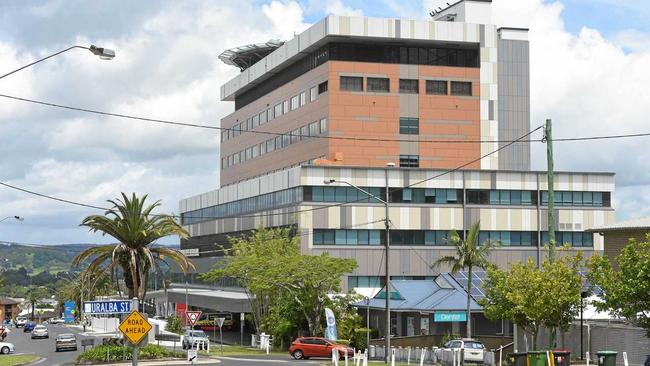Chef was 'thrashing out', sweating before death
AN INQUEST has heard from police officers, who said they did not place unnecessary pressure on the 23-year-old's torso.

Lismore
Don't miss out on the headlines from Lismore. Followed categories will be added to My News.
UPDATE, Wednesday, 9am: POLICE officers involved in a critical incident where a man died at Lismore Base Hospital have told an inquest they did not place pressure on his torso.
The court has heard Tristan Francis Naudi, 23, died from sudden cardiac arrhythmia after being taken to the hospital by police on the night of January 23, 2016.
Police had attended Mr Naudi's Bangalow home and had transported him to the hospital for a mental health assessment after what the court heard was a "disturbed" response to drugs he consumed that day.
Those two officers, and two Lismore-based officers who assisted them at the hospital, have this week appeared as witnesses before the Coroners Court in Byron Bay.
One of the Lismore officers told the court he recalled medical staff having requested that Mr Naudi be brought into the hospital isolation room face down, but he could not recall who.
Evidence early in the inquest suggested Mr Naudi may have become upside down inadvertently as he thrashed about while being carried.
The officer recalled someone urging them to be mindful of "positional asphyxia" and said he understood this meant avoiding pressure on the windpipe on the neck as well as the chest area.
He said they knew to place "no undue pressure … on the back".
This officer and his female colleague told the court they placed their knees against Mr Naudi, but that their weight was on the mattress on the floor of the isolation room.
He said there was "minimal" downward pressure on Mr Naudi's shoulder.
When asked by Counsel Assisting whether he ever had his knee on Mr Naudi's back, the officer said he did not.
He said while Mr Naudi was "thrashing out with his legs", his handcuffed, downward-facing position meant he couldn't resist with his torso.
When asked by solicitor for Mr Naudi's partner, David Evenden, how he could be certain he hadn't placed his knee on the man's back, he said "there was no need to".
The officer had said in an earlier interview Mr Naudi had "incredible heat radiating off his body" and was "sweating profusely", the court heard.
When the officers were asked if they recalled a member of medical staff saying "get off the chest" twice, they said they could not.
Another lawyer for Mr Naudi's family, Sebastian De Brennan, suggested the officer had weight across the chef's "back and chest" in the isolation room.
"I'm going to suggest to you that he was moving around with sufficient vigour… that you had to apply a lot of pressure given the way he was kicking around his legs," Mr De Brennan said.
The witness replied: "no".
The officer's female colleague told the court Mr Naudi was yelling in a manner she hadn't witnessed before and recalled him "thrashing around" while in the isolation room.
The inquest continues.
UPDATE, Wednesday, 6am: A NURSE became distressed as she recalled the moment a young man in a hospital isolation room was found to be unresponsive.
The Coroners Court in Byron Bay yesterday heard from clinical nurse Wendy Longmuir, who was in the emergency department the night of Tristan Francis Naudi's death on the night of January 18, 2016.
Mr Naudi was transported to Lismore Base Hospital by police after he and a friend took what they believed was LSD.
The court has heard only MDMA and MDA were detected in a toxicology report.
Ms Longmuir told the court a medical duress had been called, so various hospital staff flocked to the area as part of the "duress team".
With police and Mr Naudi en route to the hospital, a doctor asked Ms Longmuir to prepare medication which would later be used to sedate him, the court heard.
Ms Longmuir explained it wasn't unheard of for a patient to be brought into the room in a "prone position", or face down, as Mr Naudi - who was "aggressive" and "thrashing around" with his legs - was that night.
"The police don't always bring everyone in face down ... but if they need to be restrained - for their own safety and the safety of others - they're placed face down," she said.
She said such a position also removed overwhelming visual stimuli that might adversely affect the patient.
"It's a calmer situation," she said.
Ms Longmuir, who appeared before court via telephone, could be heard sobbing after she recalled Mr Naudi becoming unresponsive.
"He had no heartbeat, there was nothing that we could have done to save him," she said.
"I'm so sorry ... we couldn't do anything for him."
Two Lismore-based police officers who arrived at the hospital to assist those who transported Mr Naudi told the court they had held their knees beside him in the isolation room, but never on his back.
The court heard placing downward pressure on the back of someone in a prone position would pose a risk of positional asphyxia.
Lawyers appearing at the inquest are representing Mr Naudi's de facto partner, biological father, medical staff and the Northern NSW Local Health District, NSW Police, the police commissioner and the four police officers who were involved in Mr Naudi's transport to hospital and restraint.
The court earlier heard Mr Naudi's cause of death was found to be sudden cardiac arrhythmia.
The inquest continues.
Original story, Tuesday: AN INQUEST has heard further evidence from a police officer involved in a critical incident where a young chef died at a Northern Rivers hospital.
Tristan Francis Naudi, 23, was taken to a secure room at Lismore Base Hospital on the night of January 18, 2016.
Police had attended his Bangalow home after the drug-affected Mr Naudi became aggressive and erratic.
At the hospital, he was deemed unfit for assessment and was sedated while being restrained face down with his hands handcuffed behind his back.
Within minutes of being given the sedative, he stopped breathing and despite CPR being carried out for 25 minutes, he could not be revived.
A senior constable, who began giving evidence yesterday returned to the witness stand this morning.
He was one of two male officers who first attended Mr Naudi's Bangalow home before transporting him to Lismore Base Hospital.
Solicitor David Evenden, who is representing Mr Naudi's partner in the inquest, asked the Byron Bay based officer a series of questions about his professional training history.
Mr Evenden asked about the officer's more senior colleague saying "watch out for positional asphyxia" while they restrained a handcuffed Mr Naudi face down in the hospital's isolation room.
He asked what he understood this to mean.
"Just to be careful in relation to where pressure was placed on his body," the officer replied.
He told the court he understood a possible disadvantage of using the "prone", or face down, position in restraining a person was "the possibility of asphyxiation".
Mr Evenden asked the officer, who graduated from the police academy in 2007, whether he had received formal training on positional asphyxia.
"It was mentioned through training," he said.
"We were made aware of it quite early on in the piece."
The court earlier heard Mr Naudi was face-up when police lifted him from their vehicle at the hospital, but he twisted his body around to face downward.
The officer told the court he had received training on "excited delirium" which he said he understood could be mental health or drug-related.
"Excited delirium is described as someone who's erratic, delirious … they sweat a lot," he said.Mr Evenden asked whether Mr Naudi would have fit this criteria.
"On the night, yes," the officer said.
"Do you recall whether that came to mind on the night?" Mr Evenden asked.
"I don't recall that it did. I just responded to what was going on," the officer replied.
Mr Evenden asked whether he was aware excited delirium "can cause sudden death".
"Yes, I was aware of that," he said.
He told the court officers generally received annual training on restraint techniques.
Mr Evenden asked several questions about whether police could have waited longer for an ambulance that had been called.
Counsel assisting the Crown Donna Ward interjected, reiterating police had asked for paramedics multiple times.
The court heard police on the scene were informed by their supervisor that an ambulance would not attend, and they would have to transport Mr Naudi themselves, due to his "violent" state.
"Did you agree one of the things that could have been done was to cool him down?" Mr Evenden asked.
The officer replied: "I'm not sure how we could have done that at the time."
The court heard Mr Naudi appeared to have a very high body temperature.
Mr Evenden asked whether there was an alternative to the Mitsubishi Pajero which they transported Mr Naudi to hospital in.
The Pajero, subject to a viewing by the court yesterday, contains a small "cage" at the rear of the vehicle.
The officer told the court this model was in common use, and that the second police vehicle which attended Mr Naudi's home had the same design.
The inquest is expected to run throughout the week and may be subject to further hearings at a later date.


